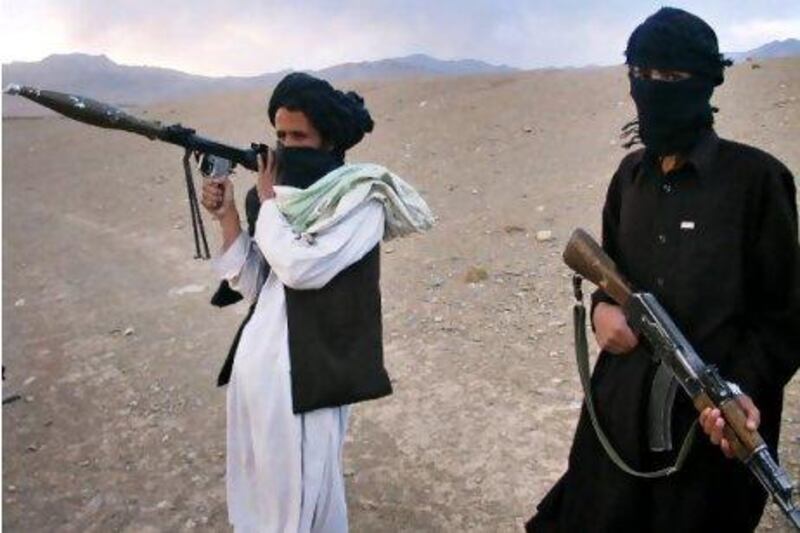KABUL // Thousands of lives have been lost and billions of dollars spent. Osama bin Laden, the mastermind behind the attacks on the United States of September 11, 2001 that prompted the US-led invasion of Afghanistan, is dead. But his one-time allies, the Taliban, lead a growing insurgency that threatens to plunge the country further into chaos.
Was the war in Afghanistan, which turns 10 years old today, really worth fighting?
The answer is no, according to many US veterans of the conflict. In a poll released this week by the Washington-based Pew Research Centre, less than half of the US troops who fought in Afghanistan say the war was worth the fight.
Just over half - 51 per cent - of US veterans of the wars in Afghanistan and Iraq said in the survey that relying too much on military force creates hatred that leads to more terrorism.
More than 1,670 US troops have died so far in Afghanistan since 2003, according to icasualties.org, an independent website tracking military deaths in Afghanistan and Iraq.
But now, the US-led Nato forces plan to end their fighting role while reassuring the Afghan government that international troops are committed to seeing Afghanistan through to a durable peace.
For many Afghans, too, the past 10 years is a decade lost to corrupt politicians and revenge-seeking, anti-Taliban warlords made both wealthy and strong by the international effort to provide some peace and stability in Afghanistan.
About US$50 billion (Dh184bn) in reconstruction aid has been poured into the country, but the majority of Afghans still live in dire poverty and much of Afghanistan's infrastructure remains in disrepair.
Gulmar Jan, a resident of Kandahar province, spiritual homeland of the Taliban, said: "I don't think the past 10 years were worth it, because, look at the situation we are in right now."
Since Nato troops drove the pro-Al Qaeda Taliban regime from power in 2001, violence has increased steadily as remnants of that regime took up arms against the western-backed government.
Last year marked the most violent for Afghan civilians since the United Nations began tracking civilian deaths in 2007, with 2,777 dead.
Mr Gulmar Jan said: "The foreigners have failed us. It was very bad under the Taliban, but now we are afraid of the future. We don't know what will happen,"
The Afghan National Army (ANA) and Afghan National Police (ANP), however, are actually less pessimistic than American troops about the cost of the last 10 years.
Taliban infiltration plagues their ranks, but as Nato undertakes a mammoth mission to boost and train local security forces, there remains a core of dedicated Afghan troops ready to fight.
While it is true that Afghan security forces have a poor reputation, Afghan troops suffer the highest casualties of any group in Afghanistan and many disagree that the last decade was one of little progress.
Abdul Najib, a 32-year-old policeman in the eastern province of Nangarhar, said: "Under the Taliban, there was nothing. No jobs, no life, no police, no security. We face problems now, but at least we are fighting for something. And when we are injured or our colleagues are killed, our commitment to Afghanistan only gets stronger."
Since 2007, 2,234 ANA troops and 3,273 Afghan police have died in the conflict, according to a report compiled by the US Congress in August this year. Abdul Matin, a commander of an Afghan Local Police (ALP) unit in Wardak province, said he took up arms in the militia programme, where villagers are armed by US special forces to fight the Taliban but often with little oversight, critics say, when government forces controlled little more than the main highway that runs through the verdant but impoverished province.
Mr Abdul Matin said at least eight of his friends have died in combat, but that the sacrifice was worth it to keep the insurgents at bay.
Wardak was the site of a US helicopter crash in August, when a Taliban-launched RPG took down the chopper, killing 30 US Navy Seals in the biggest single loss for American troops since the war began.
"We never get any sleep. We do not take holidays - we are spending all of our days fighting the Taliban," Mr Abdul Matin said. "Even if I lose my own life or the lives of my children, I am ready to make this sacrifice. We cannot turn away from this fight now."
Afghan army generals say the Taliban's use of guerrilla tactics - ambushes, suicide bombs, rocket attacks and political assassinations - indicates that the insurgency is on the run, unable to effectively fight the increasingly capable Afghan troops.
General Sher Mohamed, an ANA general in the south, said: "There are one or two attacks in the provinces each day, but from a military point of view, they are weak attacks. They are not strong enough to topple our government."
At this juncture, however, the inability of the insurgents to battle conventional Afghan forces may be irrelevant, observers say.
On Tuesday, Afghanistan's spy agency revealed it had foiled a plot to assassinate the Afghan president, Hamid Karzai. Last month, insurgents assassinated former Afghan president and chief of the High Peace Council, Burhanuddin Rabbani, in a suicide attack at his home in Kabul.
Mahmoud Khan, a member of parliament from Kandahar, said: "The overall political situation in the country is getting worse. Everyone knows that now the insurgents or their spies have sneaked into the government, and they are there and that's why these assassinations are taking place. You cannot stop these attacks."





